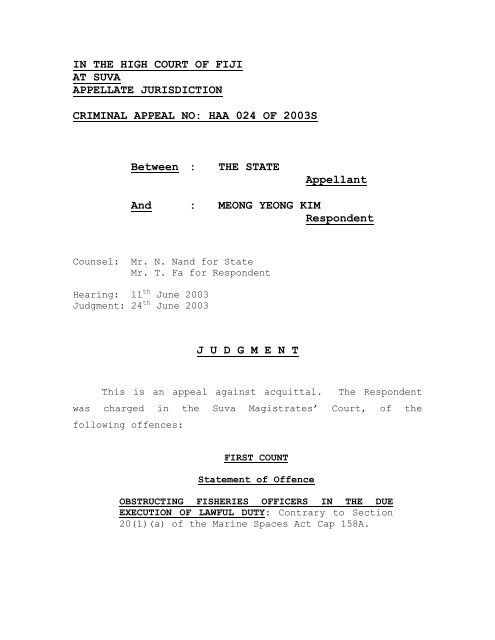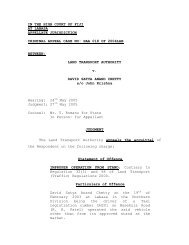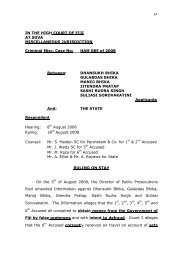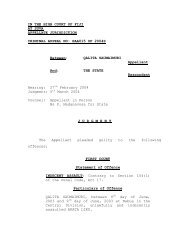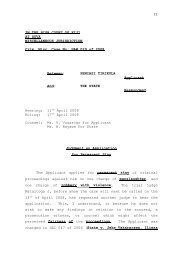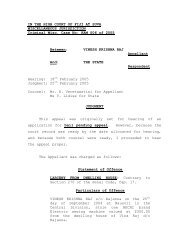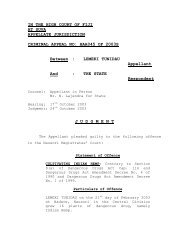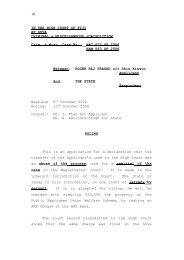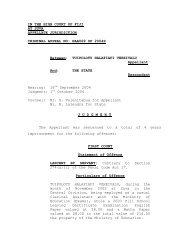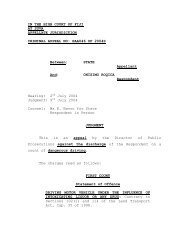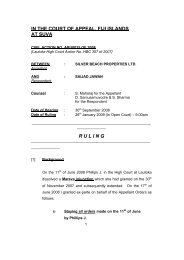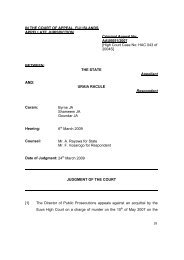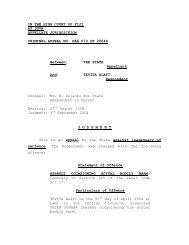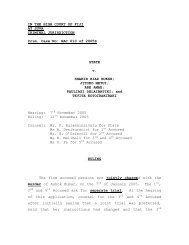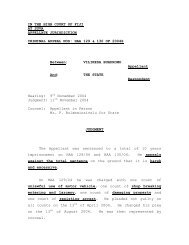Download State v Meong Yeong Kim HAA024J.03S - Law Fiji
Download State v Meong Yeong Kim HAA024J.03S - Law Fiji
Download State v Meong Yeong Kim HAA024J.03S - Law Fiji
Create successful ePaper yourself
Turn your PDF publications into a flip-book with our unique Google optimized e-Paper software.
IN THE HIGH COURT OF FIJIAT SUVAAPPELLATE JURISDICTIONCRIMINAL APPEAL NO: HAA 024 OF 2003SBetween :THE STATEAppellantAnd : MEONG YEONG KIMRespondentCounsel: Mr. N. Nand for <strong>State</strong>Mr. T. Fa for RespondentHearing: 11 th June 2003Judgment: 24 th June 2003J U D G M E N TThis is an appeal against acquittal. The Respondentwas charged in the Suva Magistrates’ Court, of thefollowing offences:FIRST COUNT<strong>State</strong>ment of OffenceOBSTRUCTING FISHERIES OFFICERS IN THE DUEEXECUTION OF LAWFUL DUTY: Contrary to Section20(1)(a) of the Marine Spaces Act Cap 158A.
2Particulars of OffenceMEONG YEONG KIM, on the 4 th day of August 2002on board the Fishing Vessel South Star atPrincess Wharf, Suva in the Central Division,obstructed the Fisheries Boarding Officerswhilst carrying out their lawful duty.SECOND COUNT<strong>State</strong>ment of OffenceOBSTRUCTING FISHERIES OFFICERS IN THE DUEEXECUTION OF LAWFUL DUTY: Contrary to Section20(1)(a) of the Marine Spaces Act Cap 158A.Particulars of OffenceMEONG YEONG KIM, on the 6 th day of August 2002at Suva in the Central Division, obstructedthe Fisheries Officers whilst carrying outtheir lawful duty.The Respondent pleaded not guilty and the trialproceeded on the 21 st of October 2002. On 10 th January 2003,the learned Magistrate acquitted the Respondent on bothcounts. The Director of Public Prosecution appeals againstthe acquittals on the following grounds:(a)(b)That the learned trial Magistrate erredin law and in fact when he acquitted theRespondent.That the learned trial Magistrate erredin law and in fact in failing to takeinto consideration the evidence of firstprosecution witness giving evidence withrespect to the first count ofobstruction.
3(c)(d)That the learned trial Magistrate erredin law and in fact in failing to takeinto consideration the evidence of thirdprosecution witness giving evidence withrespect to the second count ofobstruction.That the learned trial Magistrate erredin law and in fact in finding that theaccused did not have the necessary mensrea even though on the evidence asadduced before the learned trialMagistrate it was found that the accusedhad committed the actus rea of theoffences at all material times asalleged by the prosecution.The evidenceThe prosecution evidence was that fisheriesenforcement officers had a duty to enforce <strong>Fiji</strong>’s fisherieslaws. This included the checking of ships and their logbooks. On 4 th August 2002, Mr. Simione Cagilaba, afisheries officer boarded the “South Star” and informed theCaptain that he was there to “clear” the boat. He askedfor the vessel documents. The Captain and his agent, oneMr. <strong>Kim</strong> Junior were present, and after Mr. Cagilabainsisted, the Chief Officer (the Respondent) brought thecatch log book. He would not let Mr. Cagilaba look at itand took it away to the Captain’s cabin.Mr. Cagilaba, another fisheries officer, Mr. Wainiqoloand the Respondent then went down to the freezer. WhileMr. Cagilaba was conducting a survey of the freezer, Mr.Wainiqolo called out saying that the freezer door was beingshut from outside.
4Mr. Wainiqolo’s evidence was that he had to crawl outof the bottom door of the freezer to get out. His evidencereads:“We went to survey the ship’s freezer, withthe accused, to do the volumetric survey ofthe same. We called out to the accused, hedidn’t answer. There were 2 rooms in thefreezer downstairs. The accused was with usin the freezer. After that we called accusedto stay with us as we do the survey. He didnot respond. I realised they want to lock usin the freezer. I climb up the ladder. I sawthe freezer door already shut. The door canbe open from the outside. I saw the door. Thetop part of the freezer door was locked. Iran towards the door. I kicked the bottompart of the door and it opened. I tried toopen the top part of the door, but it waslocked. The two doors can’t be opened fromthe inside. I struggled out of the bottomdoor of the freezer to come outside. Imanaged to get out. I saw the accusedoutside. The accused was holding the metaldoor (main door) and in the process of lockingus inside. PW1 was in the bottom part of thefreezer. I shouted to PW1 to come up as theaccused tried to lock us in the blast freezer.I stood beside the door. The freezer was verycold. I did not complete the survey.”On 6 thAugust 2002 Filipe Viala, a fisheries officerresponsible for the transit of fish from ships tocontainers, asked for the catch log book of the “SouthStar”.The Respondent came with the book and Mr. Vialatook it from him. Whilst he was checking the log, theRespondent grabbed the book from the table and spoke to Mr.Viala in an aggressive and abusive manner.Mr. Viala wasunable to continue his work. Later they went to the vessel
5to check the ship’s log book. Whilst in the vehicle theRespondent again grabbed the catch log book from thedashboard. He was reprimanded by the fisheries officers.At the naval base, the Respondent again grabbed the bookalthough he gave it back to Mr. Viala on request.In his statement to the police, the Respondent said inrelation to the catch log:“since that book which you call the catch logand I call it the Captain’s Personal RecordBook, I cannot give it to them because it doesnot belong to the boat, but personally belongsto the Captain.”He denied behaving in an abusive or obstructive mannerand said that the Captain had instructed him to give theFisheries Officers the catch log book. He said, of theincident on the 6 th of August:“I denied that I behave in an abusive manneror I had obstructed the Fisheries Officers inany manner whatsoever. One of the officerswho was holding the Captain’s personal recordbook was rough in turning the pages which werecoming off. I couldn’t see this happen to theCaptain’s Record Book so I took it from theofficer and gave it back to him at theFisheries Office.”He further told the police that he did not know thatFisheries Officers had powers to search ships. He said hedid not intend to lock the officers into the freezer. Hesaid he just closed the door of the freezer to prevent thetemperature from fluctuating thus spoiling the fish inside.He said the door was closed, not locked and that the
6officers could open it from inside. In his two interviews,he said nothing about having difficulties understanding theFisheries Officers.In court however the Respondent in his sworn evidencesaid that he did not understand what the Fisheries Officerswere saying. He said the Captain told him to get the fishlog book and he obeyed. He showed it to the FisheriesOfficer and then took it back to the Captain’s room. Hesaid he then took the officers to the freezer at theirrequest and closed the doors. He said he did not lock thedoor and that they could open it by pushing from theinside. He said that on 6 th August 2002 he did grab thefish log from the table because he wanted to protect itfrom clumsy handling.In his judgment, the learned Magistrate accepted theRespondent’s denial that he ever intended to obstruct theFisheries Officers. He accepted that there was acommunication problem between the Respondent and theOfficers and said, at page 8:“…… Because of the language difficulties, andthe lack of an interpreter, when the accusedwas communicating with PW1, PW2, and PW3, atthe material time, and given what Defencecounsel mentioned on page 13 and 14 of hiswritten submission, I find it difficult if notimpossible to conclude that the accused had thenecessary mens rea or guilty intent at the timethe various above-mentioned “actus reus” werecommitted. On oath, the accused said through aKorean interpreter that he understood verylittle, or no English at all.”
7He further found as a matter of fact:“It could be observed that the accused did nothave the intention to obstruct PW1, PW2 andPW3, in their official duties, at the materialtime. He was merely trying to safeguard andprotect the ship’s fishing log. Furthermore,he did not intend to lock PW1 and PW2 in theship’s freezer. The language difficultiesbetween the accused and PW1, PW2 and PW3 waslargely the cause of the problem.”The Respondent was acquitted accordingly.The appealThe decision of the learned Magistrate is, accordingto <strong>State</strong> counsel, perverse and contrary to the evidence.Firstly, he submitted, in his caution statement, theRespondent said nothing of having difficultiesunderstanding what the Fisheries Officers wanted.Secondly, in his sworn evidence the Respondent’s evidencewas not that he did not understand, but that he knew whatthe Fisheries Officers wanted but had a duty to protect thebook despite their requests. Thirdly, he submitted, thelearned Magistrate failed to consider the cumulative natureof all the acts of the Respondent.There is some force in his submissions. A reading ofthe evidence at the trial reveals a continuing course ofunco-operative behaviour on the part of the Respondent.His defence was not “I did not understand what theywanted”, but appears to have been “I know what they wantedbut had a duty to protect the Captain’s book and the fish,and never intended to obstruct them.”
8Counsel for the Respondent however lays the problem atthe door of the Fisheries Officers who should, he said,have taken a Korean interpreter to the ship.Neither counsel was able to address me on whether“intent to obstruct” was a necessary element of theoffence. Section 20(1)(a) of the Marine Spaces Act Cap158A provides inter alia:“Any person who –(a) obstructs or hinders any fisheriesofficer or any person assisting him inthe exercise of any of his powers underthis Act …. shall be guilty of anoffence and liable on conviction to afine not exceeding five thousanddollars.”There is no requirement of proof of “wilful” or“unlawful” which is often an element of the offence ofobstructing public officers. In the submissions of defencecounsel in the lower court, it was never submitted thatthere was a need to prove an intent to obstruct. At thehearing of this appeal, there was no submission made thatthe fisheries officers were not acting in the due executionof their duties.In the lower court <strong>State</strong> counsel referred to the caseof Ricketts –v- Cox (1982) Crim. L.R. 184 which defined theoffence of obstructing police officers in the execution oftheir duty. In that case two police officers were lookingfor youths responsible for an assault. They approached thedefendant and another man in the course of theirinvestigations. The defendant acted in an abusive and
9unco-operative manner, using obscene language. Themagistrate found that his conduct constituted anobstruction. On appeal, the Queen’s Bench Divisional Courtheld that on the facts, there was no doubt that thedefendant had obstructed the police, and the only questionwas whether he had any lawful excuse for so acting. Sincehe did not, he was properly convicted.In Hinchcliffe –v- Sheldon (1955) 1 WLR 1207 the courtdefined obstruction as “the doing of any act which makes itmore difficult for police to carry out their duty.”However the English statute required proof that theobstruction was “wilful” which meant that there should beno lawful excuse for the obstruction. In Rice –v- Connolly(1966) 2 QB 414, a man refused to answer questions whenapproached by police, and refused to accompany the officersto the police station unless he was arrested. Since theman was acting within his legal rights, he could not besaid to be obstructing the police officers.In a commentary of the Ricketts –v- Cox decision(supra) the Criminal <strong>Law</strong> Review (1982) 184 said of thedefinition of an obstruction:“While it should not be forgotten that the actcomplained of need not be “unlawful”independently of its operation as anobstruction according to Dibble –v- Ingleton(1972) 1 QB 48, a proposition which is clearlyalso correct, it seemed to be reasonably clearbefore the decision in the present case thatwhat was required was some conduct which waspositively misleading, impeding or interferingand which could not in law be justified.” (myemphasis)
10Although section 20 of the Marine Spaces Act providesno reference to the word “wilful” or “unlawful”, wilfulconduct and conduct which has no basis in any legal right(such as the right to remain silent) appear to have becomepart and parcel of the offence of obstruction. This is notto say that there must be an intention to obstruct. It isenough that the accused wilfully acted in a way whichactively misled the officers, or physically prevented themfrom doing their lawful duty.Certainly, on the prosecution’s version of the facts,there was such a physical prevention. The Respondent’sacts prevented them from inspecting the freezer on the 4 thof August, from inspecting the log book on the same day,and delayed its inspection on the 6 th of August. The use ofhostile and abusive language could have led to a conclusionon the part of the court, that here was an accused who wentbeyond the merely unco-operative, to the obstructive. Thatwas a possible, and I accept, a logical conclusion whichcould have been drawn from the prosecution case.However the learned magistrate did not accept that theRespondent was obstructive or even hostile. Instead hefound that he was caught in a misunderstanding exacerbatedby difficulties in communication. Of course this defencewas contrary to the Respondent’s caution statement, andindeed to the prosecution case. However, on the facts ofthe case, I cannot say that this was not a possibleconclusion that the learned Magistrate could have drawnfrom the Respondent’s evidence. Further, although thelearned Magistrate erred in looking for evidence of an
11intent to obstruct, when no such proof is required in law,he did not err when he found that the Respondent’s beliefthat he was acting properly to protect the Captain and thebook, was relevant to the question of whether there was anobstruction. In concluding that the Respondent’s conductarose not from an obstructive conduct, but from suspicionand lack of understanding, the learned Magistrate made adecision he was entitled to make on the facts of this case.It follows that although the learned Magistrate didnot adequately consider the inconsistencies in theRespondent’s defence, and erroneously directed himself onthe need for proof of an intent to obstruct, he did not errin finding that there was no obstruction. This was afinding of fact which was open to him on the evidence. Itis a finding that any appellate court must be loathe tointerfere with.For these reasons the grounds of appeal must fail.The appeal is dismissed.……………………………………………………Nazhat ShameemJUDGEAt Suva24 th June 2003


